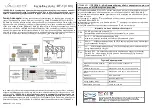
Installation
and
Preparation
for
Use
Preparing
the
P
olarization
Controller
for
Use
Connecting
the
Agilent
11896A
to
a
power
source
The
polarization
controller
is
a
portable
instrument
and
requires
no
physical
installation
other
than
connection
to
a
power
source
.
C
A
U
T
I
O
N
Do
not
connect
ac
power
until
you
have
veried
that
the
line
voltage
is
correct
and
the
proper
fuse
is
installed.
Damage
to
the
equipment
could
result.
P
ower
requirements
T
able
2-2.
Agilent
11896A
P
ower
Requirements
Characteristic
Requirement
Input
V
oltage
90
to
264
Vrms
Frequency
47
to
63
Hz
P
ower
60
V
A
(maximum)
Checking
the
fuse
The
recommended
fuse
is
a
2
A,
250
V
,
Agilent
part
number
2110-0710.
The
line
fuse
is
housed
in
a
small
container
in
the
line
module
(refer
to
Figure
2-1).
The
spare
fuse
is
stored
below
the
line
fuse
.
T
o
check
the
fuse
,
insert
the
tip
of
a
screwdriver
between
the
instrument
and
the
side
of
the
container
.
Gently
pull
outward
to
remove
the
container
.
If
the
fuse
is
defective
or
missing,
install
a
new
fuse
in
the
proper
position
and
reinsert
the
fuse
container
.
2-4
Summary of Contents for 11896A
Page 2: ...User Programming and Service Guide Agilent 11896A Polarization Controller ...
Page 17: ...Contents ...
Page 18: ...1 General Information ...
Page 30: ...General Information Speci cations and Characteristics 1 13 ...
Page 35: ...General Information ...
Page 36: ...2 Installation and Preparation for Use ...
Page 54: ...3 Using the Agilent 11896A Polarization Controller ...
Page 59: ...Rear Panel Features The Agilent 11896A rear panel 1 Power input 2 GPIB connector 3 6 ...
Page 65: ...Using the Agilent 11896A Polarization Controller Using the Agilent 11896A ...
Page 66: ...4 Programming ...
Page 100: ...5 Veri cation and Service Information ...
Page 121: ...Veri cation and Service Information ...
Page 122: ...A Choosing the Scan Rate and Measurement Time ...
Page 126: ...B Measurement Considerations ...
Page 131: ...Measurement Considerations ...
Page 132: ...Index ...
















































